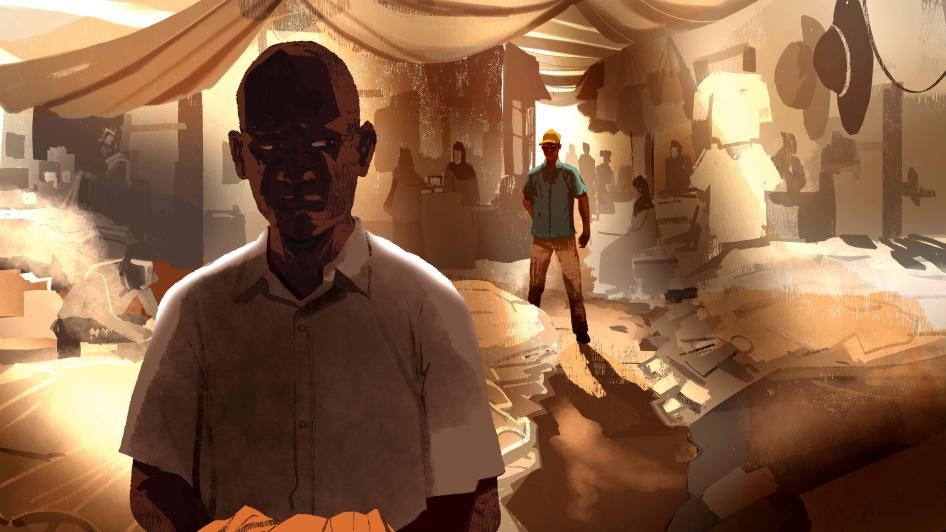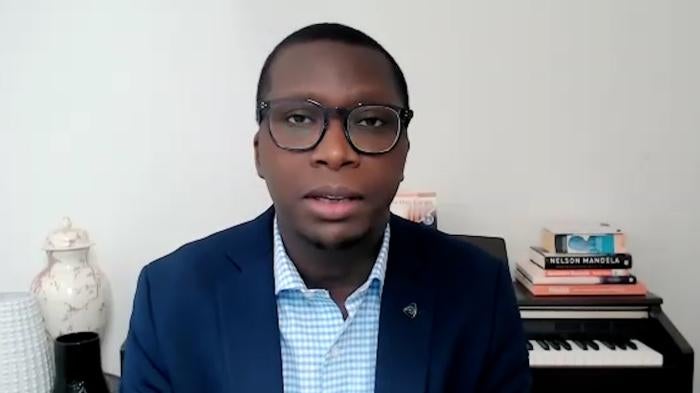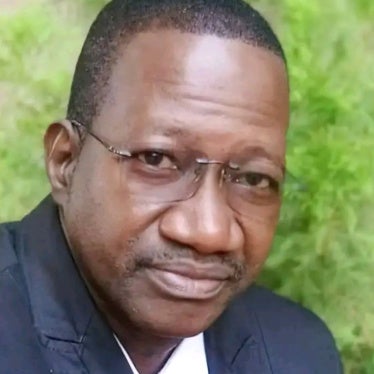Since the genocide, which devastated the country and claimed more than half a million lives in 1994, Rwanda has made great strides in rebuilding its infrastructure, developing its economy, and delivering public services. But civil and political rights remain severely curtailed, and freedom of expression is tightly restricted. Those who dare to criticize government policy or President Paul Kagame do so at great risk; and even those who’ve fled abroad to escape persecution aren’t safe. A new Human Rights Watch report outlines how the government of Rwanda keeps tabs on dissidents, both real and perceived, and how threats and acts of intimidation also happen across borders. The repression of Rwandans living abroad ranges from killings, kidnappings, beatings, and enforced disappearances to manipulated extradition requests, arbitrary detention, and attempted or successful renditions.
The failure of the international community to recognize the severity and scope of the Rwandan government’s human rights violations, both domestically and abroad, as well as the ruling party’s growing hostility toward those it perceives as challenging its power, have left many Rwandans with nowhere to turn. Holding Rwanda accountable for its domestic human rights record is now a necessity to tackle the government’s extraterritorial repression.
- What tactics does the Rwandan government use to silence opponents abroad?
The Rwandan government uses a whole playbook at its disposal to go after critics. In the east and southern African countries where we did research, Human Rights Watch has found how Rwandans have been killed, forcibly disappeared, kidnapped, arbitrarily arrested, physically attacked, or threatened to be sent back to Rwanda.
In western countries, Rwandans deemed to be against the government are afraid of being spied on. They also fear the Rwandan government’s manipulation of Interpol (the International Criminal Police Organization), and their Red Notices, alerts seeking the arrest and extradition of a wanted person. The fact that some refugees have been warned to take measures to protect themselves by domestic law enforcement or intelligence agencies adds credibility to the threats they face.
But one of the Rwandan authorities’ most effective – and insidious – ways to intimidate those living abroad is by targeting their relatives in Rwanda. It means that even people living in countries where their rights and security should be protected do not express themselves freely for fear of seeing their families suffer the consequences. One Rwandan activist in a western country said that after he left, one of his relatives was detained and brutally tortured. In another case, two brothers of a Rwandan refugee who now lives in Australia were forcibly disappeared.
- What effect do these repressive tactics have on Rwandans abroad?
Even abroad, Rwandans who are deemed opponents of Rwanda’s government do not feel safe. They are worried about socializing, not knowing who they can trust. They talk about being afraid when a car pulls up behind them or when someone visits their workplace. Some have gone so far as to change their names, refuse to socialize with others in the community, or avoid traveling to certain countries altogether. They regularly change phones, worry about surveillance and attacks. Many who have chosen to continue their public criticism of Rwanda’s government while living in exile had to cut ties with their relatives in Rwanda to protect them from harassment or worse.
Those interviewed by Human Rights Watch spoke of a palpable fear. If someone from the Rwandan community dies under suspicious circumstances, it causes fear and paranoia in parts of the community.
- Are these abusive tactics new?
Human Rights Watch has been documenting cases involving attacks or threats against critics outside Rwanda since the late 1990s. Like today, those cases from the past revolve around victims that were likely to have been targeted because of their criticism of the Rwandan government, the ruling party, or President Kagame. A striking example from 10 years ago is the murder of Patrick Karegeya, which took place in January 2014. Following his murder in South Africa, Rwanda’s president, prime minister, and ministers of foreign affairs and defence all publicly used strong language, branding Karegeya as a traitor and an enemy and implying that he got what he deserved.
Rwanda was among the countries that actively sought to utilize new technology that would allow it to hack into the phones of opposition members.
- What are some of the most striking cases documented in the report?
In Mozambique, human rights abuses against the Rwandan refugee community there have increased since Rwandan troops were dispatched to combat an insurgency in the country’s northernmost province, Cabo Delgado. An influential businessman was killed under murky circumstances and Human Rights Watch documented several attempted kidnappings and an enforced disappearance, such as that of a former journalist and opposition activist. He was taken into police custody in May 2021 in the presence of someone who spoke Kinyarwanda, Rwanda’s national language. He has not been seen since. The disappearance had ripple effects across the entire community: no one feels secure.
In Australia, refusing to work for the government triggered a cascade of harassment that resulted in a former refugee’s relatives in Rwanda being arrested arbitrarily and tortured – his brothers were then disappeared – and repeated attempts by pro-government media and government officials to discredit and intimidate him.
In the US, Rwandan authorities issued an Interpol Red Notice against a former government official, which Interpol later reviewed and deleted. Rwanda’s authorities also tried to get the former government official’s lawyer to drop him as a client and to get some of his professional connections to cut ties with him.
- Who is involved in these abuses?
Many people interviewed by Human Rights Watch spoke of a network of associations with ties to Rwanda’s Ministry of Foreign Affairs called the Rwandan Community Abroad (RCA). The RCA and others close to the government are coercing refugees into joining them and are putting pressure on them to donate money or to return to Rwanda and stop criticizing the government. Lionel Richie Nishimwe, a lawyer and advocate for the Rwandan refugee community in Zambia, was one of those who caved to pressure and returned to Rwanda. There, he was put up in a hotel and pressured to divulge information about fellow refugees. He refused and has since disappeared.
Rwandan agents are thought by some interviewees to have infiltrated domestic refugee agencies, too, which is why many Rwandans are wary of requesting asylum for fear of being targeted as a result.
Embassies are also involved. At times, embassy staff in African countries were implicated in threatening refugees, saying they will meet the same fate as those who’ve been disappeared or murdered if they don’t return to Rwanda or toe the line.
In some cases of attacks, the perpetrators were not identified, but spoke Kinyarwanda, and were suspected of working for the Rwandan government. For example, some of the victims were told they would be handed over to Rwanda or were accused of being enemies of Rwanda. The context of broader persecution of government critics inside Rwanda provides credibility to the allegation that these attacks were politically motivated. It also raises serious and plausible concerns about the possibility of official state tolerance, acquiescence, or even collusion in these attacks.
- Why does the Rwandan government go to such extraordinary lengths to silence its critics?
The Rwandan government cares deeply about its image. It spends a lot of money on lobbying firms to bolster the perception it is a clean and safe country that invests in development, and where there is virtually no corruption. While some of this may be true, it also deals brutally and ruthlessly with critics who could challenge its hold on power and act as potential threats to its carefully manicured image of a country people would never want to flee.
- Are authorities of the host countries where Rwandan refugees live aware of the repression?
They are but appear to prefer inaction. The US government, for example, deported a former trade union official despite a leaked FBI report stating that a Rwandan intelligence agent had “almost certainly” planted false information against the accused during the US Immigration and Customs Enforcement's (ICE) investigation.
In the UK, authorities told Rwandans for years to be wary of being tracked, until the British government struck a deal with Rwanda to send asylum seekers there. Both the French and UK authorities had to get involved in the cases of two naturalized Rwandans – now French and UK citizens, respectively, living in those countries – who were arbitrarily detained while on a visit to Rwanda, apparently in retaliation for their relatives’ political activities in exile.
In South Africa, investigations into suspected killings have stalled and one person’s relative was warned to stop pressing for answers.
In Uganda, authorities told a Rwandan dissident traveling on an Australian passport to leave the country because Rwanda wanted him deported.
In Tanzania, police arrested a Rwandan kidnapping victim and his kidnappers and put them all on trial for entering the country illegally. Although it’s one of the rare cases where judicial authorities openly recognized the involvement of Rwandan intelligence in the case, no kidnapping or attempted kidnapping charges were brought against the Rwandan intelligence agent.
In almost all cases of kidnappings, forced disappearances, or suspicious killings, investigations have stalled or failed to result in any arrests or prosecutions.
Turning a blind eye to Rwanda’s human rights record has allowed the country to position itself as a valuable partner for peacekeeping missions in Africa and a safe haven for refugees while at the same time exporting its repression globally.
- What should be done?
The Rwandans interviewed for this report want improved protection, recognition of their situation, and a more principled approach to Rwanda from their host governments. They want Rwanda’s international partners to call out the many human rights violations the Rwandan government commits, and to demand an end to transnational repression. Some have asked that their family members be able to join them in exile, especially those whose relatives are still in Rwanda and are in danger of retaliation. And they request that host governments take the threats they live under seriously and to investigate murders and kidnappings of Rwandans abroad.









